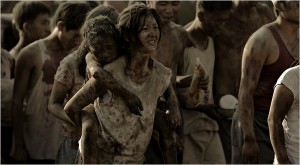It’s a rare sight to find a foreign film on the marquee at a mainstream movie theater these days. While art-houses like the Coolidge, the Kendall and the Brattle theaters all specialize in the alien and exotic, the AMCs and Regals of the area are far less likely to jump on board with the latest French romance or German character study. So it was a welcome surprise to see the Chinese melodrama Aftershock briefly roosted for a few weeks at the AMC Loews theater at the Boston Common. It certainly earned its stay, since this big-budget foreign drama is one of the great films of the year.

Aftershock (Tangshan Dadizhen), directed by Chinese movie mogul Xiaogang Feng, is follows a family as they cope with tragedy. It’s 1976 in the city of Tangshan when a sudden earthquake devastates the town, and in particular, one family. The terrifying event itself is a marvel of filmmaking. Augmented by CGI that mercifully take a backseat to physical effects, we watch the ground rip open and devour those thrown into its gaping maw. A panicked man scrambles out of a crumbling window only to be crushed by a falling sign, and a tilting crane slowly tumbles onto a mass of survivors who scurry to avoid the behemoth. Rippling cracks race along the floors and walls of the apartment complexes as children scream and create some of the best disaster suspense this side of Titanic.
In a flash, the earthquake is over, and thousands of the naked dead choke the streets. It’s a horrifying image, made all the more real by the personal suffering. Ni Yuan, played by Fan Xu, discovers her two twin children are buried under the rubble alive, separated by a slab of concrete. But in order to free her child, one must be sacrificed. Moving the slab to save the daughter will crush the son, and vice versa.
The film surprisingly does not linger on this Sophie’s-Choice-esque plot, as the choice is quickly dispensed away with in the first 20 minutes of the film. Aftershock, as the title implies, is far more interested in the aftermath of the mother’s decision, and how the shattered family must live with and eventually move on from a loss. As much as Aftershock succeeds as a disaster movie, it’s as a family drama that the film truly excels, with some of the most well-written and real characters portrayed by some of the best acting in contemporary cinema.

Aftershock is layered in melodrama but manages to straddle the line of good taste thanks to the talented cast. Even when the plot seems to take an unnecessary twist into unwanted pregnancy, the actors pull the film back down from the stratosphere through sheer will of performance. For a storyline so fraught with suffering and intrigue, it’s always made real, always believable. Daoming Chen, who plays a loving foster father, is in particular one of the best in the film. He is a recognizable figure as the doting understanding father, yet suffers from his own demons as he lets his child drift away for years. Ni Yuan, the mother, is another complex character, one who begs to care for her baby but years later refuses to extend the same courtesy when the tables turn. These flawed heroes are one of the great strengths of Aftershock, and help audiences connect to a foreign culture easily misunderstood by Western.
One such element is a common theme throughout the film: guilt. Deep, resentful, painful familial guilt is a cornerstone of the film and subtly invades every scene. The photos of the dead hang in black and white frames behind the characters as they speak, lurking like remembered ghosts from the past, ever-watching, ever-judging. The mother, Ni Yuan refuses to move from their old home. “I told your father and sister for 20 years how to find their way,” she explains, “I will have to tell them again.” As her child takes her to look at apartments, the scene is bookended by apartment complexes on either side of the frame. As the characters argue, the camera cuts back. The car sits at center, and there, quietly towering in the hazy background, are three looming cranes, an ominous reminder of the collapsing crane that almost killed Ni Yuan during the earthquake decades earlier. It’s these small touches that make the film more than just a family drama, but a thoughtful reflection of past and present as well.
The world-class cinematography is another great coup for Aftershock. The intro to the film is shown in intimate golden-hued shots of a picturesque life which fade to bleak grays in the aftermath of the quake. But it is only after the quake that we see other colors besides the heavenly yellows and dismal blacks. First, the green of a military uniform. Next, the red of a torn dress. Slowly, color seeps into this chaotic world, and director Xiaogang Feng shows a master’s eye for the screen. His shots are in parallel, echoing back to earlier motifs hours later. Such skill is especially shocking coming from Feng, who was known before this film for his holiday comedies. No longer; Aftershock will be Feng’s master work for years to come.
Aftershock has been chosen as China’s representative for the Best Foreign Language Film at the Academy Awards and for good reason. This family melodrama is buoyed by excellent effects, a stellar cast, and a twisting storyline that keep viewers enthralled until the final bittersweet scene. Don’t miss out on this powerful film when it rumbles back onto Netflix: A

One Comment on “‘Aftershock’ Review: Disaster Strikes, but Pain Remains.”